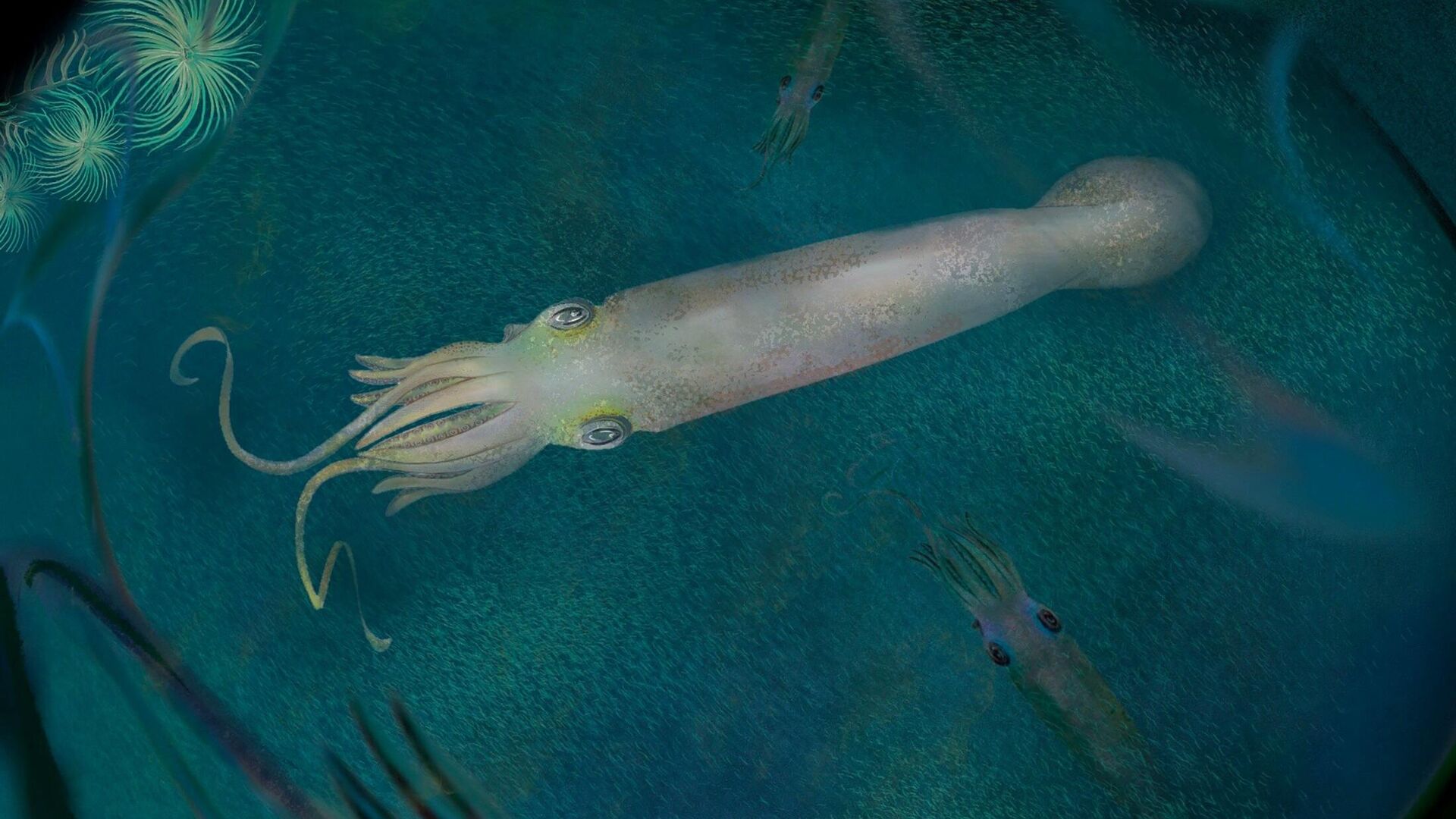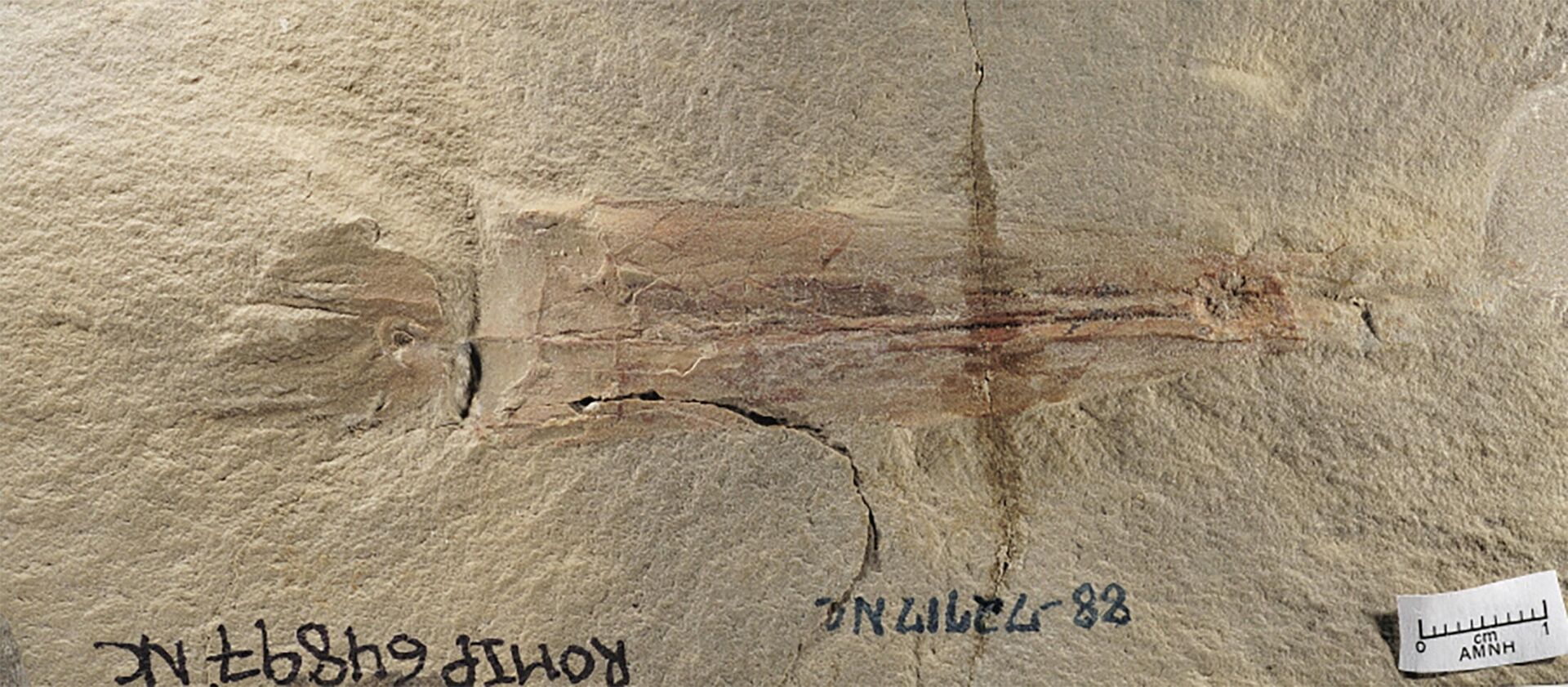https://sputnikglobe.com/20220309/fossil-of-prehistoric-vampire-squid-named-after-us-president-biden-1093711729.html
Fossil of Prehistoric 'Vampire Squid' Named After US President Biden
Fossil of Prehistoric 'Vampire Squid' Named After US President Biden
Sputnik International
This is a very rare fossil of a creature that used to inhabit the tropical waters that surrounded North America more than 320 million years ago, scientists... 09.03.2022, Sputnik International
2022-03-09T11:31+0000
2022-03-09T11:31+0000
2022-03-09T11:31+0000
squid
joe biden
biology
https://cdn1.img.sputnikglobe.com/img/07e6/03/09/1093711963_0:68:2200:1306_1920x0_80_0_0_c1203904bedd039690518cc787d78f28.jpg
Researchers at the American Museum of Natural History recently stumbled upon a fossilised body of the torpedo-shaped creature, which was dubbed Syllipsimopodi bideni and was added to the list of species named in honour of US presidents. Christopher Whalen and his colleague Neil Landman found the creature on a museum shelf where it had been stored following its discovery in the Bear Gulch Lagerstätte formation in Montana more than thirty years ago. According to them, the discovered creature swam in the tropical waters of North America some 328 million years ago. The ancient animal had ten arms, two of them longer that the other eight, which is similar to squid and cuttlefish. This feature inspired the name of the creature's genus - Syllipsimopodi, which is the Greek for "prehensile foot". According to Whalen, the finding offers insight into the earliest stage of the existence of vampyropods - one of three groups of soft-bodied cephalopods containing remnants of internal shells. "Having an organism this early on that's lost the shell on the vampyropod side indicates that they developed an alternative means of buoyancy control relatively early in their evolutionary history," Dr Whalen said.The researcher explained why he decided to name the creature after Biden. The ancient squid-like creature is not the first species to be named after recent presidents. The previous US President Donald Trump has Dermophis donaldtrumpi, a blind amphibian that buries its head in the sand, while Barack Obama has at least nine species named after him including an extinct lizard (Obamadon gracilis).*Let’s stay in touch no matter what. Follow our Telegram channel to get all the latest news: https://t.me/sputniknewsus
Sputnik International
feedback@sputniknews.com
+74956456601
MIA „Rosiya Segodnya“
2022
News
en_EN
Sputnik International
feedback@sputniknews.com
+74956456601
MIA „Rosiya Segodnya“
Sputnik International
feedback@sputniknews.com
+74956456601
MIA „Rosiya Segodnya“
squid, joe biden, biology
squid, joe biden, biology
Fossil of Prehistoric 'Vampire Squid' Named After US President Biden
This is a very rare fossil of a creature that used to inhabit the tropical waters that surrounded North America more than 320 million years ago, scientists say.
Researchers at the American Museum of Natural History recently stumbled upon a fossilised body of the torpedo-shaped creature, which was dubbed Syllipsimopodi bideni and was added to the list of species named in honour of US presidents.
Christopher Whalen and his colleague Neil Landman found the creature on a museum shelf where it had been stored following its discovery in the Bear Gulch Lagerstätte formation in Montana more than thirty years ago. According to them, the discovered creature swam in the tropical waters of North America some 328 million years ago.
The ancient animal had ten arms, two of them longer that the other eight, which is similar to squid and cuttlefish. This feature inspired the name of the creature's genus - Syllipsimopodi, which is the Greek for "prehensile foot". According to Whalen, the finding offers insight into the earliest stage of the existence of vampyropods - one of three groups of soft-bodied cephalopods containing remnants of internal shells.
"Having an organism this early on that's lost the shell on the vampyropod side indicates that they developed an alternative means of buoyancy control relatively early in their evolutionary history," Dr Whalen said.
The researcher explained why he decided to name the creature after Biden.
"I submitted my paper fairly soon after his inauguration … and it seemed like a natural way to celebrate that moment...I was particularly encouraged by some of the plans that he put forward to counter climate change," Whalen told ABC.
The ancient squid-like creature is not the first species to be named after recent presidents. The previous US President Donald Trump has
Dermophis donaldtrumpi, a blind
amphibian that buries its head in the sand
, while Barack Obama has at least nine species
named after him including an extinct lizard (
Obamadon gracilis).
*Let’s stay in touch no matter what. Follow our Telegram channel to get all the latest news:
https://t.me/sputniknewsus



